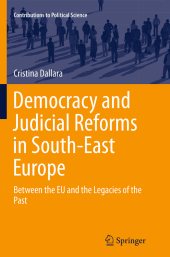 Neuerscheinungen 2016Stand: 2020-02-01 |
Schnellsuche
ISBN/Stichwort/Autor
|
Herderstraße 10
10625 Berlin
Tel.: 030 315 714 16
Fax 030 315 714 14
info@buchspektrum.de |

Cristina Dallara
Democracy and Judicial Reforms in South-East Europe
Between the EU and the Legacies of the Past
Softcover reprint of the original 1st ed. 2014. 2016. xxvi, 124 S. 1 SW-Abb., 6 Tabellen. 235 mm
Verlag/Jahr: SPRINGER, BERLIN; SPRINGER INTERNATIONAL PUBLISHING 2016
ISBN: 3-319-37821-X (331937821X)
Neue ISBN: 978-3-319-37821-3 (9783319378213)
Preis und Lieferzeit: Bitte klicken
This book analyses judicial reforms in five countries of South-East Europe, focusing on two factors influencing the outcome of reforms: the role of the European Union in light of the pre-accession process and the legacies of past communist regimes.
The book analyzes the topic of judicial reforms in four countries of South-East Europe, focusing on two specific factors that have influenced the reforms in the past two decades: the role played by the European Union in light of the east Enlargement process and the legacies of the communist regimes. Specifically, the aim is to account for similarities and differences in the reform paths of Slovenia, Romania, Croatia, and Serbia. In each country, in fact, the influence of the EU policies has been differently mediated by national factors that, broadly conceived, may be considered as expressing the legacies of the past regimes. In some cases, these legacies challenged judicial reforms and inhibited the influence of the EU; in other cases, they were positively overcome by following the route suggested by the EU. Some explanatory factors for these differences will be proposed drawing from democratization studies, Europeanization literature, and comparative judicial systems.
The book focuses on countries having different status vis-a` -vis the EU and differently involved, in term of timing, in the EU accession process: some of them are new member states entered in 2004 (Slovenia) or in 2007 (Romania); others were, until recently, acceding countries (Croatia) or candidates to the membership (Serbia). This comparison allows investigation of the power of EU conditionality in different phases of the EU enlargement process.
vis-a` -vis the EU and differently involved, in term of timing, in the EU accession process: some of them are new member states entered in 2004 (Slovenia) or in 2007 (Romania); others were, until recently, acceding countries (Croatia) or candidates to the membership (Serbia). This comparison allows investigation of the power of EU conditionality in different phases of the EU enlargement process.
Foreword.- Introduction.- 1 Judicial Reforms in SEE Democratising Countries. Towards a Contextualized Framework for the Analysis.- 2 Smoother Judicial Reforms in Slovenia and Croatia: Does Legacy of the Past Matter?.- 3 The Successful Laggard in Judicial Reform: Romania Before and After the Accession.- 4 The Long and Disputed Judicial Reform Process in Serbia: Legacies of the Past and Predominant National Actors.- 5 EU Driven Judicial Reforms Between Legacies and National Actors´ Strategies: Any Lessons Drawn?.
Cristina Dallara is permanent researcher in Political Science at the Research Institute on Judicial Systems of the National Research Council (IRSIG-CNR) in Bologna. In 2006, she held a PhD in Political Science at the University of Florence and later on, a biannual post-doc fellowship from the University of Bologna. In 2011-2012, she was Jean Monnet Fellow at the European University Institute of Florence. Her research interests relate to public policies, public administration, judicial and anti-corruption policies, EU enlargement and democratization. She was also involved as expert by the Council of Europe and OSCE in studies for the evaluation quality of justice and judicial independence in transitional countries. From 2009 to 2012 she was in the Board of coordinators of the EU Life Long Learning funded project "Menu for Justice".


